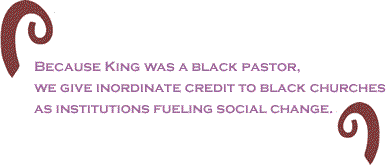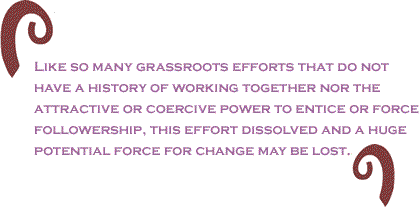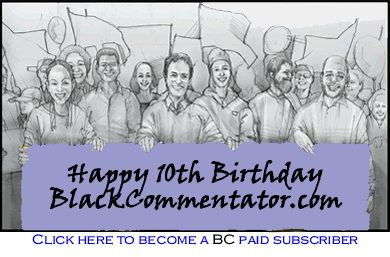Last
week saw the dissolution and reformation of an important
coalition in Oakland that had arisen out of the financial
crisis and the spotlight on economic inequities brought
by the Occupy Movement. The Oakland Coalition for Social
and Economic Justice (OCSEJ) has reformed with a different
collection of organizations and players. The causes for
the dissolution are a microcosm of the causes of the schisms
that divide groups, communities, and individuals of good
intent everywhere in the US. The causes were a complicated
mixture of misunderstanding, pre-judging, chauvinism,
condemnation-by-association, institutional pride, racial
prejudices, ageism, and the inability or reluctance of
some to articulate or to engage in a discussion about
the imposition of a religious dogma on a diverse coalition.
Like so many grassroots efforts that do not have a history
of working together nor the attractive or coercive power
to entice or force followership, this effort dissolved
and a huge potential force for change may be lost.
There is no question that the coalescing energy for this
now defunct coalition was derived from the hosting of
the effort by one of the most influential black churches
in Oakland. Accept for the sporadic participation of a
rare few pastors and spirit-led lay persons, black churches
as individual organizations have played only a very minor
role in recent struggles for economic justice. Many participants
in the OCSEJ struggled with their elation at the engagement
of what they perceived as a powerful black institution
and their discomfort with the nature of the leadership
style offered for a culturally diverse coalition. Because
of the shallowness of all of our understandings of the
civil rights movement and the organizing work of Martin
Luther King Jr., there is a false perception of the role
of black churches in general in that struggle. Many seem
to have forgotten how black Christian leadership � particularly
the national leadership � resisted King and his tactics.
Because King was a black pastor, we give inordinate credit
to black churches as institutions fueling social change.
Occupy in general has been excoriated from the left and the
right for not having a specific agenda or a clearly identified
leadership. I think that the Occupy agenda is the rectification
of economic inequities and that the lack of a clearly
identified leadership is a strength. I also know that
the accommodation or tolerance for leaderless organizational
structures and dynamics is culture bound. Many organizing
and institutional traditionalists are not comfortable
in such structures. These traditionalists are much more
comfortable with the kinds of authoritarian, top-down,
militaristic leadership-followership structures that dominate
US society and that have been part of so much that has
oppressed the 99% over many years. IMHO that discomfort
level of traditionalists does not make (of itself) the
Occupy movement�s style bad or wrong or stupid. The civil
rights movement - which had just pivoted to deal with
questions of economic justice - ended because of the assignation
of its one leader, King. There is no way anyone could
end the Occupy Movement by co-opting, corrupting, or killing
any set of individual leaders. We are all leaders and
that is a strength. That criticism of the Occupy Movement
arises out of movement strategy ignorance and a lack of
creativity.

In Coalition meetings the principal representative of this
Oakland black church, by intent or unconsciously, put-down
through innuendo and directly the representatives and
formations of the Oakland Occupy movement. This was tolerated
for a time out of elation at the Church�s involvement.
Criticism of his leadership style was backed-down by his
charges of disrespect of African American leadership.
The representative justified his dominance by referring
to an unexamined view of what the nature of African American
leadership style is and by subtly leveraging the use of
the meeting space of the Church and the Church�s potential
influence with City and private forces.
My examination of his African American leadership style claim
leaves me questioning his understanding. There is no question
that African American institutions have been infected
with what theologian Elaine Pagels writes about as the
dominance hierarchy; Christianity as a movement was infected
with this hierarchy thousands of years ago when Roman
Emperor Constantine adopted Christianity as a state religion.
These dominance structures were then passed to African
American Christians during slavery and afterward. Present
day evidence and anthropological studies have shown that
most traditional Continental African leadership styles
were more along the line of servant-leaders. Leaders did
not demand obedience because of their positions, their
possession of crowns, titles, or staffs. Both before leadership
investiture and afterward, traditional African leaders
continuously displayed leadership skills and judgments
that were beneficial to everyone in the village. Traditional
African Chiefs earned their followers allegiance by what
they did for their followers. Generally they did not lean
on positional power or hereditary power. Using resources,
including social capital, to entice or coerce obedience
is no different than what the 1% and their agents do to
cower the rest of us. If authoritarianism is the traditional
African American leadership style, we ought to drop it
like we dropped chitterlings as a defining African American
food tradition.

The Oakland Coalition has found another space in which to
meet. Followers do have a choice as to whether to submit
to dominance practices or not. We all can find creative
ways that are accessible to folks from diverse cultures
by which to organize and be effective.
Another major cause of the dissolution of the Coalition was
due to a misunderstanding of the nature of the Oakland
Occupy Movement in regards to how it functions. This ignorance
of the Occupy coalition partners contributed to a simplistic
damming-by-association that is also done by right wing
demagogues and the corporate media. The problematic association
for the Church was related to the question of the use
of violence � against property. Despite the efforts of
many of us and despite the efforts of almost all of the
Occupy formations that were in the meeting rooms at the
Church, Oakland�s Occupy General Assembly currently has
a �diversity of tactics� philosophy in regards to violence.
I think this is a mistake and that a growing number of
Occupy activists are working hard and will eventually
change this philosophy to a commitment to nonviolent action
� which does not mean ending challenges to public and
private institutions.
However, damming-by-association is not only pre-judgment
it is also � IMHO � unchristian. Damming-by-association
is one aspect of the System�s racist response to African
Americans in general. Every African American male must
carry the burden of every other African American male
that has done something the status quo public and private
institutions do not like. Each white person generally
is treated more as an individual � for what they do as
individuals; but, as in the case of Trayvon Martin, a
black person could not walk down the street without the
lethal assumption being made that he is likely a suspicious
criminal. We ought not do that to each other. I am a part
of the Occupy movement but I do not agree with the �diversity
of tactics� philosophy because it is an excuse to use
violence by some and violence is almost never helpful
in bringing about radical change.

But, let me say something about the ineffectiveness of a
dogmatic �fundamentalist� approach to those who more than
reserve the option to use violence. From my reading of
the Gospels � and in the Protestant tradition lay people
are encouraged to read the Bible themselves and develop
a personal understanding and interpretation � Jesus frequently
met with and engaged those who he might disagree with,
including those whose practices would be abhorrent to
him. His practice was not one of coercion, enticement,
or dominance but one of persuasion. He worked among the
Jewish people who had a common cultural set of values
and found the common ground there that he worked with
to inspire personal and societal change. By His example,
the Christian way of working in the Coalition would have
been to have found that common ground in the member�s
desire for economic justice and to have moved from there
to fashion a working structure that was open to a diversity
of leadership practices, strategies, tactics, and actions
meant to make radical change happen; and to do that all
through persuasion not through enticements or coercions.
A dogmatic view on nonviolence was used as a justification
for exclusion not inclusion; this is not a way to unify
a nonviolent movement. Neither Gandhi nor King was absolute
on the question of violence. In fact, in John 2 (13-18)
we learn that Jesus Himself was violent against the property
of the money lenders and dove sellers in the temple; He
forcefully whipped their cattle, turned over their tables
and scattered their coins. Both Gandhi and King �embraced
nonviolence as a moral example, and believed that the
paradox (of �loving your enemy�) changes the world more
than politics or violence ever can or will.� Absolutism
is not called far.
Andrew Sullivan recently wrote about Thomas Jefferson�s Bible
where at the age of 77 he cut out holes from the pages
to construct his own understanding of Jesus� true voice
from the voices in the Bible of those who bent to the
dominance paradigm rather than a �love your enemy� paradigm.
Jefferson characterized this as separating the �diamonds�
from the �dunghill.� Jefferson is the architect of the
separation of Church and State principle in the Constitution.
Sullivan says that �the ability to be faithful in a religious
space and reasonable in a political one has atrophied
before our eyes.� I think that Andrew Sullivan is not
cognizant of a missing dynamic that was present at Jefferson�s
time and some time afterward that is gone today. The Protestant
Revolution had sparked an open public theological debate;
unfortunately dominance paradigms sometimes spun these
debates into oppression and wars. However that theological
dynamism was the context that allowed the intersecting
of the social psychological space of faith with the social
psychological space of reasoning in every active participant
in the body politic. Sullivan implies that those spaces
can or could be separated. I do not think that that was
Jefferson�s understanding. Jefferson and others during
his time were also actively engaged in theological discussion
both internal to their denominations and across denominations
while also engaging in political discussion. If we had
more of the former today, there might be more understanding
that we are all searchers for the truth and believers
deserving respect rather than assuming we are Godless
heathens or people whose motivations are suspect because
we do not profess a specific belief or the dominant society�s
beliefs.

I agree with Sullivan when he says that Jefferson�s type
of politically active Christian was ��the kind of Christian
(who) seeks always to translate religious truths into
reasoned, secular arguments that can appeal to those of
other faiths and none at all.� For Jefferson, �No man
can conform his faith to the dictates of another. The
life and essence of religion consists in the internal
persuasion or belief of the mind.� Jefferson feared that
the alternative to a Christianity founded on �internal
persuasion� was a revival of the brutal, bloody wars of
religion that America was founded to escape. Public theological/Weltanschauung
discussion allows for a deepening of spiritual engagement
and the discovery of common human understandings that
would enrich our secular discussions in a democratic society.
Without this public discussion, we sit in our on �world
views� and �throw stones� and assumptions at each other.
Separation rather than war has been the current result of
one Church�s efforts to impose its understanding of the
proper way to organize to end injustice as part of a diverse
Coalition.
[Note that the author objects to the term �Occupy� and favors
the use of the term �Decolonize� instead but for the sake
of general reference to the movement has used the �Occupy�
label.� Also, note that the author believes that Sullivan
has unforgivably left out the reasons other than religious
freedom that are the founding bases for the US: theft
of land, slavery, and the acceptance of a dominance paradigm
camouflaged as manifest destiny.]

BlackCommentator.com Guest Commentator, Wilson
Riles, is a former Oakland, CA City Council Member. Click here
to contact Mr. Riles.

